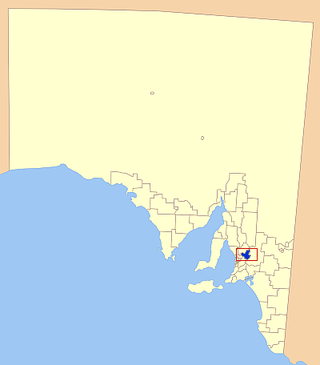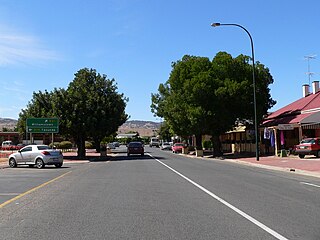Related Research Articles

The Barossa Valley is a valley in South Australia located 60 kilometres (37 mi) northeast of Adelaide city centre. The valley is formed by the North Para River. It is notable as a major wine-producing region and tourist destination.

Barossa Council is a local government area in the Barossa Valley in South Australia. The council area covers 912 square kilometres, and had a population of over 23,000 in the 2016 Census.

Nuriootpa ( NURE-ee-UUT-pə) is a town in South Australia and the major commercial centre of the Barossa Valley, about an hour's drive north of the state capital, Adelaide. The name of the town is reputed to be the local Aboriginal word for "meeting place".

George Fife Angas was an English businessman and banker who, while residing in England, played a significant part in the formation and establishment of the Province of South Australia. He established the South Australian Company and was its founding chairman of the board of directors.

Lyndoch is a town in Barossa Valley, located on the Barossa Valley Highway between Gawler and Tanunda, 58 km northeast of Adelaide. The town has an elevation of 175m and an average rainfall of 560.5mm. It is one of the oldest towns in South Australia.

Angaston is a town on the eastern side of the Barossa Valley in South Australia, 77 km northeast of Adelaide. Its elevation is 347 m, one of the highest points in the valley, and has an average rainfall of 561 mm. Angaston was originally known as German Pass, but was later renamed after the politician, banker and pastoralist George Fife Angas, who settled in the area in the 1850s. Angaston is in the Barossa Council local government area, the state electoral district of Schubert and the federal Division of Barker.

John Howard Angas was an Australian pioneer, politician and philanthropist.
Johannes Menge, is regarded as South Australia's first geologist, though he had no formal qualifications. An early explorer of the new colony, he was influential in the settlement of the Barossa Valley.

The Barossa Light & Gawler Football Association, more commonly referred to as the BL&GFA, is an Australian rules football competition based in the Barossa Valley, Gawler Region and Light Region of South Australia, Australia. Just 42 kilometres north of the state capital of Adelaide, the BL&GFA is an affiliated member of the South Australian National Football League. In 2022, Nuriootpa secured the premiership cup for a record equalling eighth time. The current president of the League is Mick Brien and the major sponsor of the league is the Grant Burge Winery.
The Barossa Valley railway line is a railway line with several branches, running from Gawler into and through the Barossa Valley. The original terminus was at Angaston. A branch was built from Nuriootpa via Stockwell to Truro, and a further branch from that to Penrice. The Angaston and Truro branches are closed and removed; the line to Penrice remains but has not been used since 2014.

John Langdon Parsons, generally referred to as "J. Langdon Parsons", was a Cornish Australian minister of the Baptist church, politician, and the 5th Government Resident of the Northern Territory, 1884–1890.
The Barossa Trail is a 40 kilometres (25 mi) cycling and walking path through the Barossa Valley in South Australia. Until 2019 the 27km between Gawler and Tanunda was named the Jack Bobridge Track.
Flaxman Valley is a locality on the eastern slopes of the Barossa Ranges in South Australia. The unbounded locality of Craneford was originally a private subdivision and is now also located in the Bounded Locality of Flaxman Valley.
The Leader is a weekly newspaper that was first published in Angaston, South Australia on 24 July 1918, and continues being published to the present day in the Barossa Valley. It was the first English-language newspaper covering any part of the Barossa Valley, apart from the Kapunda Herald.
The 1933 Barossa state by-election was a by-election held on 8 July 1933 for the South Australian House of Assembly seat of Barossa. The by-election was caused by the death on 4 June 1933 of independent MP Dr Herbert Basedow, who had regained the seat at the 1933 election less than two months prior. He had previously held the seat from 1927 to 1930.
The Tolley family were important winemakers, merchants and distillers in South Australia. Members of the family formed three businesses: A. E. & F. Tolley, wine merchants of Leigh Street, Adelaide, Tolley Scott & Tolley, distillers of Stepney and Nuriootpa, better known by the initials "T.S.T.", and Douglas A. Tolley Pty, Ltd., winemakers of Hope Valley.

The Hundred of Nuriootpa is a cadastral unit of hundred in the County of Light, South Australia split between in the eastern Adelaide Plains and western Barossa Valley. Named in 1847 for an indigenous term officially thought to mean "bartering place" and traditionally used as neutral ground for trading between various indigenous tribes, it is bounded on the south and east by the North Para River.
A by-election was held on 22 November 1924 for one of the seats of the three-member electoral district of Barossa, South Australia. The cause for the by-election was the death of William Hague on 9 October 1924. Despite a field of seven candidates from three parties for three seats at the general election in March, only two candidates stood for the by-election in November. The result was that Henry Crosby for the Liberal Federation with 3732 votes defeated Michael Joseph Murphy for the Labor Party with 3063 votes.

The Angaston Football Club, nicknamed the Panthers, is an Australian rules football club located in Angaston, a town on the eastern side of the Barossa Valley in South Australia.
Edward Angas Johnson, known as Angas or E. Angas Johnson, was City Health Officer of Adelaide, South Australia. His name has very frequently been misspelled as "Angus" Johnson.
References
- ↑ "New Silesia". The South Australian Colonist and Settlers' Weekly Record of British, Foreign and Colonial Intelligence . Vol. I, no. 14. Australia. 9 June 1840. p. 209. Retrieved 27 November 2020– via Trove.
- ↑ "Boards of Health". South Australian Register . Vol. XLIX, no. 11, 876. South Australia. 5 December 1884. p. 6. Retrieved 27 November 2020– via Trove.
- ↑ "Angas Park Subdivision". The Mail (Adelaide) . Vol. 14, no. 664. South Australia. 14 February 1925. p. 12. Retrieved 28 November 2020– via Trove.
- ↑ "Angas Park Distillery". South Australian Register . Vol. LXV, no. 16, 645. South Australia. 20 March 1900. p. 3. Retrieved 28 November 2020– via Trove.
- ↑ Valerina Changarathil. "End of the SA Line for Angas Park". The Advertiser (Adelaide) . Retrieved 27 November 2020.